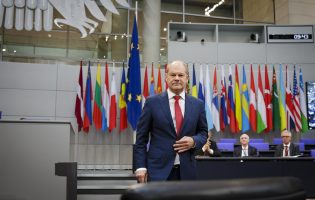Power Brokers in Difficult Times? The Role of German Political Foundations in Transatlantic Relations
Dr. Nicole Renvert’s recent book, “Machtmakler in schwierigen Zeiten?: Die Rolle der deutschen politischen Stiftungen in den transatlantischen Beziehungen,” (WVT, 2014) is an insightful survey of public policy research institute’s transforming role in transatlantic relations and is available from the publisher, WVT Wissenschaftlicher Verlag Trier.
Highlighting the research underlying this book, AGI hosted a seminar on February 27, 2014 entitled “Power Brokers in Difficult Times? The Role of German Political Foundations in Transatlantic Relations” with Renvert, a Fellow at the Center for Global Cooperation Research, Käte-Hamburger Kolleg of the University Duisberg-Essen, and Non-Resident Fellow at AGI. In the seminar, Dr. Renvert focused on why these political foundations were created in the U.S., how they developed, and what current political challenges they face.
Today, these foundations continue to be important actors but they face new challenges. Their active involvement in democratization processes is seen as critical. Some countries did not allow them to continue their work or monitor their activities very closely. The Konrad-Adenauer-Stiftung had to close its offices in Abu-Dhabi and in Egypt; KAS’ support for Vladimir Klitschko as presidential candidate in Ukraine is highly controversial. Countries like Russia, Turkey, or Indonesia distrust the activities of the foundations and issued new regulations to better monitor their work. There are also structural challenges to their work. The environment has changed due to a growing number of private actors involved in democratization and political dialogue. Some of the foundations are facing financial shortages in the near future and need to come up with new concepts to stay relevant. They all have to be innovative to attract a new generation of political leaders. Their transatlantic activities now cover more than the bilateral dialogue between Germany and the U.S. and, as such, expectations are growing. Can they successfully adjust to these new tasks and challenges?








